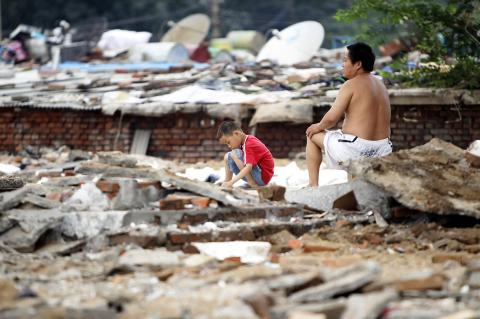China has shut down 24 schools for the children of migrant workers in Beijing, forcing more than 14,000 students to drop out, state media said, sparking anger among parents who say they face discrimination.
Local officials told the migrant schools that they had not met safety and hygiene standards.
“I felt very sad when I heard the school will be shut down, I have to send my children back to our hometown in Henan,” 42-year-old waste collector He Zhongshan said at the Dongba Experimental School, on the northeastern outskirts of the capital. “The living standard in Beijing is much better than in my hometown and education here is good, but for public schools, my children will need many certificates to be enrolled.”

Photo: Reuters
While the overwhelming majority of China’s 150 million rural migrant workers see their future in cities and towns, they are often treated as unwelcome “interlopers” and have few rights.
China’s residence permit system, which channels most welfare, housing support and healthcare to urban residents, means that migrant workers do not have access to state-subsidized schools.
“The authorities claim they will find places for all displaced children, but they deliberately set the threshold for school placement qualification so high that the vast majority of migrant families cannot meet the requirements,” Geoffrey Crothall, director of communications for workers’ rights group China Labor Bulletin, said in e-mailed comments.
Crothall added that “the closure of migrant schools in Beijing is a cynical ploy by district governments to clear the land for property developers as land values in the outer suburbs continue to rise.”
In a note seen by Reuters, the Dongba County Government told the Dongba Experimental School that “severe hidden dangers have been found during the inspection in the first half in 2011” related to fire-fighting, power and hygiene.
“Your school must be shut down … for the safety of students, teachers and regional security and stability,” it said.
The Dongba school, which is located in a village of migrant workers and sandwiched between new high-rise apartments, started its semester two weeks early in an attempt to prevent it from being demolished, Dongba principal Yang Qin said.
In response, the local government stopped the school’s supply of water and power, according to Yang. That did not deter the school, which rented a power generator and transported its own water from the neighborhood.
Staff from other migrant schools, such as the Red Star School and the New Hope School, said the government had demolished their sites on very short notice.
“Our school has closed, forcing some 800 students to drop out,” said a representative of the New Hope School, who declined to be named. “There are still 500 -students with nowhere to go, although the local government has relocated 300 of them.”
The State Council Development Research Center, a top state think tank, said that unless migrants have better welfare, housing and legal status in towns and cities, their discontent could turn into a serious threat to stability.

THE ‘MONSTER’: The Philippines on Saturday sent a vessel to confront a 12,000-tonne Chinese ship that had entered its exclusive economic zone The Philippines yesterday said it deployed a coast guard ship to challenge Chinese patrol boats attempting to “alter the existing status quo” of the disputed South China Sea. Philippine Coast Guard spokesman Commodore Jay Tarriela said Chinese patrol ships had this year come as close as 60 nautical miles (111km) west of the main Philippine island of Luzon. “Their goal is to normalize such deployments, and if these actions go unnoticed and unchallenged, it will enable them to alter the existing status quo,” he said in a statement. He later told reporters that Manila had deployed a coast guard ship to the area

HOLLYWOOD IN TURMOIL: Mandy Moore, Paris Hilton and Cary Elwes lost properties to the flames, while awards events planned for this week have been delayed Fires burning in and around Los Angeles have claimed the homes of numerous celebrities, including Billy Crystal, Mandy Moore and Paris Hilton, and led to sweeping disruptions of entertainment events, while at least five people have died. Three awards ceremonies planned for this weekend have been postponed. Next week’s Oscar nominations have been delayed, while tens of thousands of city residents had been displaced and were awaiting word on whether their homes survived the flames — some of them the city’s most famous denizens. More than 1,900 structures had been destroyed and the number was expected to increase. More than 130,000 people

A group of Uyghur men who were detained in Thailand more than one decade ago said that the Thai government is preparing to deport them to China, alarming activists and family members who say the men are at risk of abuse and torture if they are sent back. Forty-three Uyghur men held in Bangkok made a public appeal to halt what they called an imminent threat of deportation. “We could be imprisoned and we might even lose our lives,” the letter said. “We urgently appeal to all international organizations and countries concerned with human rights to intervene immediately to save us from

RISING TENSIONS: The nations’ three leaders discussed China’s ‘dangerous and unlawful behavior in the South China Sea,’ and agreed on the importance of continued coordination Japan, the Philippines and the US vowed to further deepen cooperation under a trilateral arrangement in the face of rising tensions in Asia’s waters, the three nations said following a call among their leaders. Japanese Prime Minister Shigeru Ishiba, Philippine President Ferdinand Marcos Jr and outgoing US President Joe Biden met via videoconference on Monday morning. Marcos’ communications office said the leaders “agreed to enhance and deepen economic, maritime and technology cooperation.” The call followed a first-of-its-kind summit meeting of Marcos, Biden and then-Japanese prime minister Fumio Kishida in Washington in April last year that led to a vow to uphold international